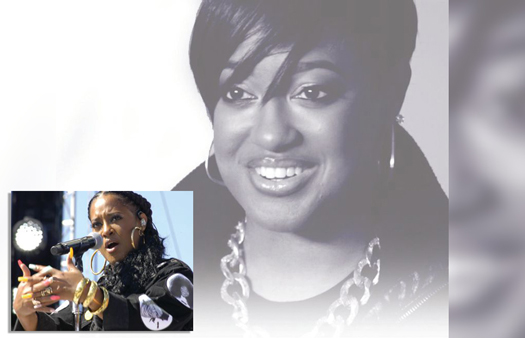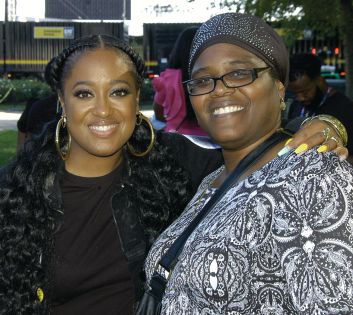Rapsody talks her role as an artist, the NFL and Jay-Z
By The Final Call | Last updated: Sep 19, 2019 - 2:48:58 PMWhat's your opinion on this article?
‘I have to understand what I represent’

Rapsody
|
Hip hop emcee Rapsody, born Marlanna Evans from Snow Hill, N.C., is not new to the rap game. Her second studio album “Laila’s Wisdom” released by Jamla Records and Jay-Z’s Roc Nation received two Grammy nominations including for Best Rap Album in 2017. Her latest release, “Eve,” was produced by record label executive and super producer 9th Wonder and is receiving critical acclaim. She has worked with J Cole, GZA, Queen Latifah, Kendrick Lamar and others. On Sept. 5 Rapsody joined Meek Mill and Meghan Trainor performing a free concert in downtown Chicago as part of the collaboration between the National Football League’s Inspire Change initiative and Jay-Z ahead of the game kicking off the 100th NFL season. While in the city, she spent time with local youth. Final Call managing editor Starla Muhammad interviewed Rapsody after her performance about her role as an artist, community engagement and Jay-Z. Below are edited excerpts from that interview.

|
Starla Muhammad (FCN): Talk a little bit about yourself as an artist. You’re not just an artist, you are invested in the community and you spoke a little bit about it today. Talk about that in terms of the importance as an artist, your influence, and getting involved in the community.
Rapsody (R): Just knowing the power that you have with your platform and your voice and for God to even put you in this position, it’s important to me to understand the power that comes with it, the influence, and that you’re impacting peoples’ lives. It’s just not that I’m going to get up here and perform and just leave and do my video. There are other people on the other end.
Even if you don’t see them, they see you. Some of them are very impressionable and they are young and they are not able to make sound decisions. So, I have to be cognizant of that and understand what I represent and how I was raised.
I want people to be inspired and be an example for them and for some that don’t have an example. So just understanding the importance in that and how moments like that can change somebody’s whole world and perspective; that’s a powerful thing for me and is something that I never take lightly.
Just thinking about some of the artists that influenced me, like Nina Simone, and she speaks about how it is an artist’s duty to reflect the times and to be an example. That’s what art, especially hip hop, has always meant for me. I don’t do it just for fame or just for money; it’s something way bigger that’s attached to it, and I think it’s part of my purpose. It’s up to me to walk in it.
FCN: How was this NFL Inspire Change partnership with Roc Nation enabling you to take your message even broader? Talk about some of the things you’re looking forward to with this collaboration.
R: Yes, it’s dope. I do so much on my own and I’m part of the Zulu Nation and we have things. Anytime somebody asks me for help, and if my calendar is open, I try to step up to it and especially this project with the NFL and Roc Nation and just trying to inspire people. I know that things have been rocky with the NFL but Jay has always been a great example of coming to the table and trying to figure out how can we communicate with each other and how can we invest and do what’s right for the community.
When I heard about it and when I heard that it was associated with the BBF (Better Boys Foundation Family Services) and the kids that it impacts; it’s in a community that I got to mentor with yesterday. The kids live in the third area with (the most) violence, they have to live with it every day. So to be able to go again and get off the stage and really sit with somebody and look them in the eye and touch them so they see that you’re real, that you’re human, that you make music and you may be successful—but I’m still a person.

Rapsody with Final Call managing editor Starla Muhammad
|
To be able to touch a kid and talk to them, that just opens their mind up and says like ‘it’s not farfetched for me to do. Somebody is right here and at least I can ask them the questions.’ That’s what this platform and this program has opened the door for me to do. To come to Chicago, I don’t live here, but they brought me here to touch these kids’ lives. I met some dope girls and they were so bright; and I want to be able to do that.
To have those opportunities even to perform on the stage in front of 14,000 people across the park and you never know who’s out there; what children they have with them. And to raise money and knowing that this money that we raise is going to a program that may only have—like yesterday I think the BBF they said they had 65 kids and only eight mentors.
So, to be able to raise money and to give money to a program like that so they have more mentors to spread out with the kids that’s so impactful to their lives. That’s why I’m invested in it because it creates direct change. And, if the NFL is going to try to do anything, that’s where I want to see the direction go, like to really change and impact somebody’s life.
FCN: As an artist with Roc Nation and your relationship with Jay Z do you feel empowered as an artist to sit down with him or even with the NFL to share your thoughts on—‘hey there’s some programs in this city that I’m aware of.’ How much freedom do you have to speak your piece, to let them know some of the initiatives that maybe you’re looking at down the line?
R: Definitely, Roc Nation has always been an open door policy. Anytime I hit Jay he responds quickly, and he listens. I know I have the freedom to reach out to him and say these are some things I’m interested in, do you think we can partner with the NFL to do this?
In my hometown in North Carolina in Snow Hill, I want to do this and whether I do it through the NFL or Roc Nation I know he’s going to help me do it. If it’s something that I’m really passionate about and it inspires change, at the core of Jay, that’s who he is. He’s my favorite artist but I’ve watched outside of music.
I remember like in 2002 I was riding through New York and on a billboard, it had his face surrounded by a bunch of young Black kids in Africa and he was doing things with water conservation. So, he’s been doing this his whole life whether we pay attention or not.
I know that I can always go to him, the big brother, and let him know what I want to do. Just watching what he did with Meek—not only did he just get him out of jail and like ‘Yo, I helped you.’ He said, Meek you have an opportunity to do something way bigger than yourself and to help with reform and to help with other people like you.
He’s (Jay-Z) been a great example for us as artists to look up to and inspire to and to be able to hit him anytime and express what we want to do. Whether we do it through the NFL or he helps us do it on our own. It doesn’t matter who you connect with as long as you’re doing the work and that’s what’s dope to me.
FCN: Sister Rapsody, thank you so much again.
R: Thank you.
INSIDE STORIES AND REVIEWS
-
-
About Harriett ... and the Negro Hollywood Road Show
By Rabiah Muhammad, Guest Columnist » Full Story -
Skepticism greets Jay-Z, NFL talk of inspiring change
By Bryan 18X Crawford and Richard B. Muhammad The Final Call Newspaper @TheFinalCall » Full Story -
The painful problem of Black girls and suicide
By Charlene Muhammad -National Correspondent- » Full Story -
Exploitation of Innocence - Report: Perceptions, policies hurting Black girls
By Charlene Muhammad -National Correspondent- » Full Story -
Big Ballin: Big ideas fuel a father’s Big Baller Brand and brash business sense
By Bryan Crawford -Contributing Writer- » Full Story






 Click Here Stay Connected!
Click Here Stay Connected!








